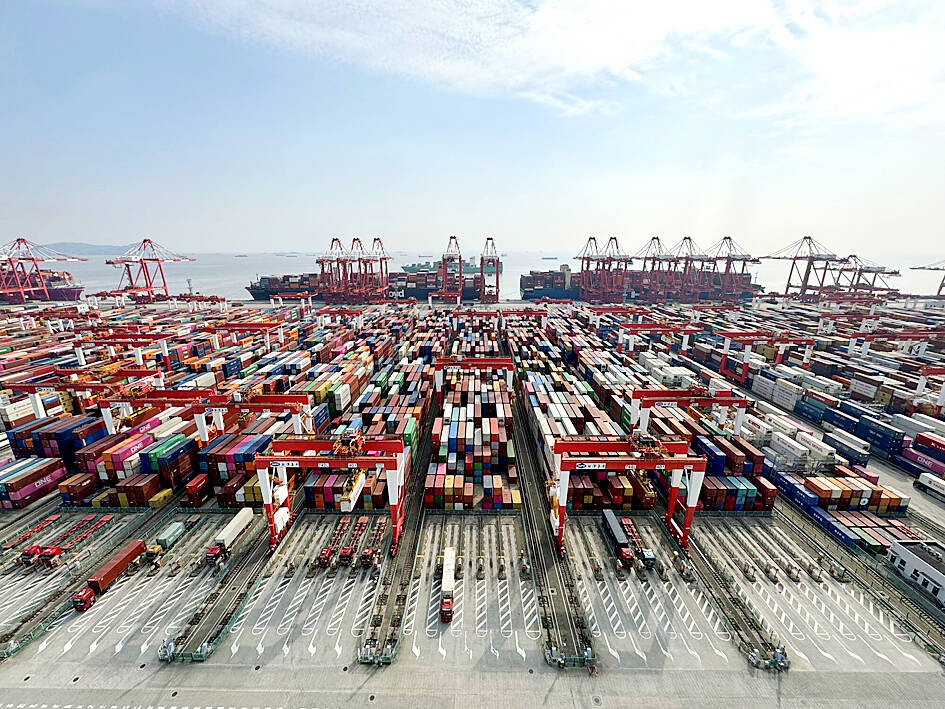China’s exports rose much less than expected last month, curbing a trade rebound that has been a bright spot for the slowing economy.
Exports climbed just 2.4 percent in US dollar terms from a year earlier, while imports inched up 0.3 percent, the Chinese General Administration of Customs said yesterday. That left a trade surplus of US$81.71 billion for the month.
Economists had forecast that exports would rise 6 percent, while imports would expand 0.8 percent.

Photo: Qilai Shen, Bloomberg
Chinese exports have been a rare source of strong growth for the economy this year, with the total value of shipments through last month the second-highest on record. However, imports have not grown as fast due to the slowdown in domestic growth, causing a record trade surplus and prompting more countries to raise barriers to Chinese goods.
Beijing has sought to bolster growth with a slew of stimulus measures, which could lift demand for imports and put pressure on prices to rise. The domestic economy has been in deflation since the second quarter of last year, which has pushed down export prices.
China has relied on manufacturing and exports to propel growth as the property sector slump hit consumer sentiment, with officials last week announcing plans for a significant fiscal stimulus package.
The country would issue special bonds to bolster banks, signaling an impending spending spree to shore up the property market and ease local government debt, Chinese Minister of Finance Lan Foan (藍佛安) said on Saturday.
China’s top banks on Saturday also said they would lower interest rates on existing mortgages from Friday next week.
“After accounting for changes in export prices and for seasonality, we estimate that export volumes softened a touch,” Capital Economics economist Zichun Huang (黃子春) said in a note yesterday.
“We think shipments will stay strong in the near term, supported by gains in export competitiveness. Further ahead, though, growing trade barriers are likely to become an increasing constraint,” Huang wrote.
Additional reporting by AFP

MULTIFACETED: A task force has analyzed possible scenarios and created responses to assist domestic industries in dealing with US tariffs, the economics minister said The Executive Yuan is tomorrow to announce countermeasures to US President Donald Trump’s planned reciprocal tariffs, although the details of the plan would not be made public until Monday next week, Minister of Economic Affairs J.W. Kuo (郭智輝) said yesterday. The Cabinet established an economic and trade task force in November last year to deal with US trade and tariff related issues, Kuo told reporters outside the legislature in Taipei. The task force has been analyzing and evaluating all kinds of scenarios to identify suitable responses and determine how best to assist domestic industries in managing the effects of Trump’s tariffs, he

TIGHT-LIPPED: UMC said it had no merger plans at the moment, after Nikkei Asia reported that the firm and GlobalFoundries were considering restarting merger talks United Microelectronics Corp (UMC, 聯電), the world’s No. 4 contract chipmaker, yesterday launched a new US$5 billion 12-inch chip factory in Singapore as part of its latest effort to diversify its manufacturing footprint amid growing geopolitical risks. The new factory, adjacent to UMC’s existing Singapore fab in the Pasir Res Wafer Fab Park, is scheduled to enter volume production next year, utilizing mature 22-nanometer and 28-nanometer process technologies, UMC said in a statement. The company plans to invest US$5 billion during the first phase of the new fab, which would have an installed capacity of 30,000 12-inch wafers per month, it said. The

Taiwan’s official purchasing managers’ index (PMI) last month rose 0.2 percentage points to 54.2, in a second consecutive month of expansion, thanks to front-loading demand intended to avoid potential US tariff hikes, the Chung-Hua Institution for Economic Research (CIER, 中華經濟研究院) said yesterday. While short-term demand appeared robust, uncertainties rose due to US President Donald Trump’s unpredictable trade policy, CIER president Lien Hsien-ming (連賢明) told a news conference in Taipei. Taiwan’s economy this year would be characterized by high-level fluctuations and the volatility would be wilder than most expect, Lien said Demand for electronics, particularly semiconductors, continues to benefit from US technology giants’ effort

‘SWASTICAR’: Tesla CEO Elon Musk’s close association with Donald Trump has prompted opponents to brand him a ‘Nazi’ and resulted in a dramatic drop in sales Demonstrators descended on Tesla Inc dealerships across the US, and in Europe and Canada on Saturday to protest company chief Elon Musk, who has amassed extraordinary power as a top adviser to US President Donald Trump. Waving signs with messages such as “Musk is stealing our money” and “Reclaim our country,” the protests largely took place peacefully following fiery episodes of vandalism on Tesla vehicles, dealerships and other facilities in recent weeks that US officials have denounced as terrorism. Hundreds rallied on Saturday outside the Tesla dealership in Manhattan. Some blasted Musk, the world’s richest man, while others demanded the shuttering of his